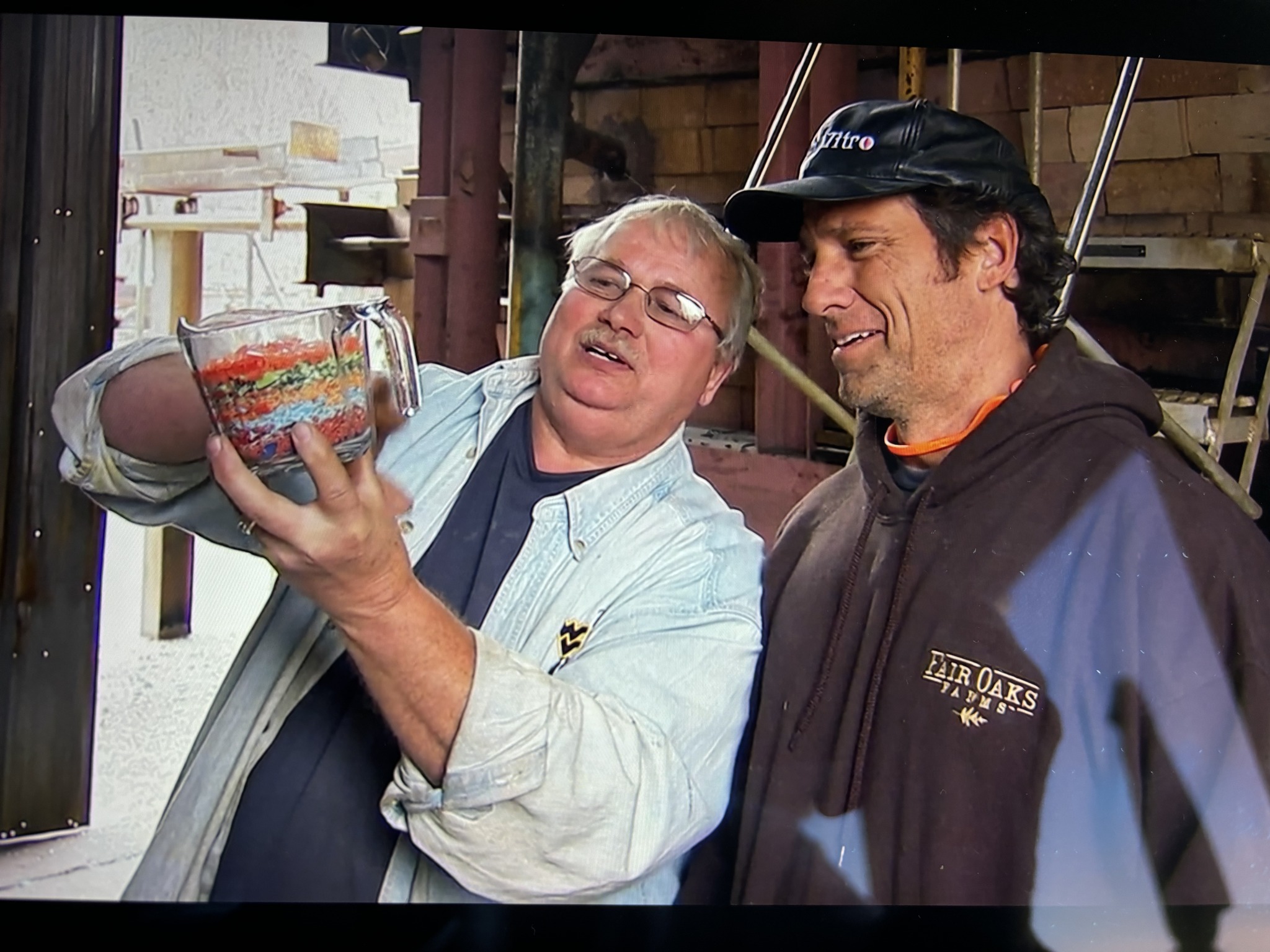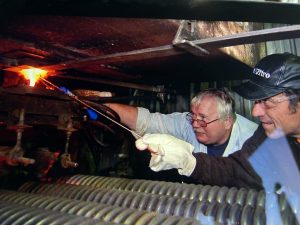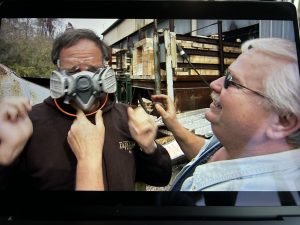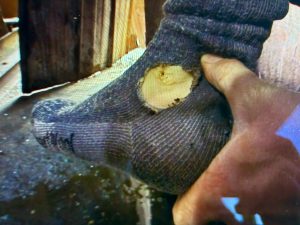
None of the shoots on Dirty Jobs were easy. Some, obviously, were harder than others, but the thing that always surprised me about making that show was how so many seemingly innocuous jobs turned out to be weirdly difficult and surprisingly hazardous, once you got into them. Take marble making, for instance. I mean, really, how dirty can it be? And why would anyone give a damn?
My host that day was a guy named Dave McCullough, and believe me when I tell you, Dave gives a damn. His passion for marbles is unexampled, and fifteen years ago, he was fully committed to making JABO – the business he ran in Reno, Ohio – the very best marble maker in America. But of course, like so many other domestic manufactures, the challenges of making marbles in America were daunting.
Moments after we met, it was clear that Dave could talk at length about the history of marbles. He told me all about their role in history and their evolution through the years. He discussed the various games that revolved around them, along with their enduring collectibility and singular beauty, when properly crafted. He had a massive personal collection and always carried around a pocketful to hand out to kids. He was also enthusiastic about their industrial utility.
“Those things you hear rattling around aerosol cans and paint cans? Those are marbles,” he said. “And we make ‘em here.”
“No kidding?” I said. “How many?”
“Millions,” he said. “We also sell marbles to mortuaries.”
“How come,” I said.
“They set the caskets on top of ‘em. Makes it easier to push ‘em around.”
If you saw the episode, you’ll recall that I spent the first hour at JABO shoveling a few hundred pounds of recycled glass into a giant crusher that smashed it to small fragments. Dave insisted I wear ear protection, eye protection, and a respirator because the dust that blew back from the crusher was toxic.
“Trust me,” he said. “This stuff can kill you.”
 From there, I dumped the smashed glass into a giant furnace that burned around 2,500 degrees. We added additional materials to create a specific design, and waited till the molten glass flowed like lava in narrow strands that dripped into a machine that cut them into something vaguely spherical. Another machine smoothed out the imperfections. Along the way I managed to burn myself three times, and I still have the scars to prove it. But my cameraman, Doug, upstaged me when a dollop of magma burned through his shoe and sock, leaving a hole that went clear through to his ankle bone. He yelped, but never stopped shooting.
From there, I dumped the smashed glass into a giant furnace that burned around 2,500 degrees. We added additional materials to create a specific design, and waited till the molten glass flowed like lava in narrow strands that dripped into a machine that cut them into something vaguely spherical. Another machine smoothed out the imperfections. Along the way I managed to burn myself three times, and I still have the scars to prove it. But my cameraman, Doug, upstaged me when a dollop of magma burned through his shoe and sock, leaving a hole that went clear through to his ankle bone. He yelped, but never stopped shooting.
Point is, making marbles is hot, dirty, and dangerous work, and that day, our viewers learned everything there is to learn about the process of doing so. But they didn’t learn much about Dave. They didn’t learn, for instance, that he was a sniper in Vietnam. A very effective one, apparently. Dave was a member of the green beret delta force, and made it home with three Purple Hearts, five Bronze Stars, a Soldiers Medal, two Air Force Medals, an Army Commendation Medal, and the Distinguishing Flying Cross.
When I asked him about his service overseas, he changed the subject to college sports. Dave loved to support local causes, especially the athletic program at West Virginia University. (Friday Night Lights is a real thing, and Dave loved it.) He was also a devoted a family man, and told me all about his wife and kids and their unconditional support for his strange obsession with marbles.
is a real thing, and Dave loved it.) He was also a devoted a family man, and told me all about his wife and kids and their unconditional support for his strange obsession with marbles.
I share all of this with you, because last week, one of Dave’s sons sent me a note. The note read, “Hello, Mike. I am the son of The Marble Man. Dave McCullough was on Dirty Jobs back in 2009, and really enjoyed doing your show. I just wanted to let you know that he passed away a couple nights ago, and that my dad had a lot of respect for you. Thank you. David McCullough’s son.”
It’s odd, but today, when I watch an old episode of Dirty Jobs, I find myself thinking more about the people I met, than the dirt I encountered, or the scars we accumulated. And I wonder if maybe the show should have been more biographical than it was. No regrets, but we focused primarily on “what” things did, and “how” things worked. Today, though, I find myself more interested in “who” and “why,” than “what” and “how.” To say it another way, I am very grateful for the chance to have met The Marble Man, and flattered to know that I earned his respect fifteen years ago. He certainly earned mine.
 Condolences to Dave’s family, and thanks to his son, for letting me know.
Condolences to Dave’s family, and thanks to his son, for letting me know.
Mike
PS. After the shoot at JABO, we sat around for a while drinking beer and talking about the strange allure that marbles hold for so many collectors. I remember thinking I wish the cameras were still rolling, when Dave talked about the satisfaction of making something beautiful from something broken, and the simple joy he sees in the eyes of kids and grown-ups alike, when he presents them with one of his creations. (People always say the best stuff when you’re not rolling.) Well, apparently, my crew left a lawn chair behind that day, along with a couple dozen empty beer bottles. The bottles were recycled and went into the next batch of marbles. As for the chair, Dave offered to send it back to LA, but it wasn’t worth the shipping cost. So, The Marble Man threw the aluminum arms and legs into his furnace, and created a special batch of marbles with a heavy metallic influence and red lines of Oxblood. He called them “Lawn Chairs,” and I’m told they were much desired by collectors in the know.
PPS. JABO went out of business some years ago. Last I checked, there was one company left standing in the marble business.
Mike’s Facebook Page
